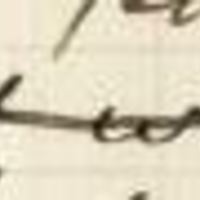“the world will not willingly let die” (John Milton)
Item
Title
“the world will not willingly let die” (John Milton)
Description
A citation of a phrase from John Milton's ‘The Reason of Church-Government Urg’d Against Prelaty’ (1642), recorded by James Joyce in the 'commonplace' notebook he maintained in the years 1903-04. The notebook is generally referred to as the Paris-Pola Notebook.
This was a period when Joyce (and his wife, Nora Barnacle) settled and resettled in locations throughout Europe, taking in spells in Paris, Pola (Croatia), and Trieste (then a major port-city in the Austro-Hungarian Empire; today part of Italy).
Many of the entries within the notebook would return in Joyce’s later fiction, particularly in Ulysses. One very short inscription, in which Joyce paraphrases a line from John Milton’s pamphlet ‘The Reason of Church-Government Urg’d Against Prelaty’ (1642), is notable for later being channelled into the famous dinner speech delivered by the protagonist of ‘The Dead’, Gabriel Conroy. The Milton line in question – “the world will not willingly let die” – is notable for afterwards having been struck through by Joyce.
This strike-through perhaps indicated Joyce’s dissatisfaction with the creative idea for which he had jotted down the citation in the first place. (Or perhaps – if Joyce were recalling the citation from memory – it indicates an uncertainty that he was recalling it correctly.) In any event, that the citation is struck through is in itself intriguing, as it anticipates and encapsulates the tonal and thematic qualities of ‘The Dead’, in which Joyce is – among other things – very much concerned with the idea of the spectral, that which remains in spite of its passing, termination, or occlusion. Though Joyce strikes through his citation of Milton here, it nevertheless remains legible on the page and, in spite of its occlusion, the citation will return in ‘The Dead’.
The scrawled citation is also interesting because it encapsulates the core theme within the story: that of the tension between past and present, the dead and those elements that linger beyond death. In his religious pamphlet, Milton expressed in passing his hope that his poetic works would outlive him, having attained a value that future generations will recognise and “not willingly let die”. In Joyce’s story, an unwillingness to let things die – to let the dead rest, to dispel the ghosts of memory – is rife.
This was a period when Joyce (and his wife, Nora Barnacle) settled and resettled in locations throughout Europe, taking in spells in Paris, Pola (Croatia), and Trieste (then a major port-city in the Austro-Hungarian Empire; today part of Italy).
Many of the entries within the notebook would return in Joyce’s later fiction, particularly in Ulysses. One very short inscription, in which Joyce paraphrases a line from John Milton’s pamphlet ‘The Reason of Church-Government Urg’d Against Prelaty’ (1642), is notable for later being channelled into the famous dinner speech delivered by the protagonist of ‘The Dead’, Gabriel Conroy. The Milton line in question – “the world will not willingly let die” – is notable for afterwards having been struck through by Joyce.
This strike-through perhaps indicated Joyce’s dissatisfaction with the creative idea for which he had jotted down the citation in the first place. (Or perhaps – if Joyce were recalling the citation from memory – it indicates an uncertainty that he was recalling it correctly.) In any event, that the citation is struck through is in itself intriguing, as it anticipates and encapsulates the tonal and thematic qualities of ‘The Dead’, in which Joyce is – among other things – very much concerned with the idea of the spectral, that which remains in spite of its passing, termination, or occlusion. Though Joyce strikes through his citation of Milton here, it nevertheless remains legible on the page and, in spite of its occlusion, the citation will return in ‘The Dead’.
The scrawled citation is also interesting because it encapsulates the core theme within the story: that of the tension between past and present, the dead and those elements that linger beyond death. In his religious pamphlet, Milton expressed in passing his hope that his poetic works would outlive him, having attained a value that future generations will recognise and “not willingly let die”. In Joyce’s story, an unwillingness to let things die – to let the dead rest, to dispel the ghosts of memory – is rife.
Subject
Citation, Intertextual Reference
Creator
James Joyce
Source
'The Joyce Papers 2002, c.1903-1928', The National Library of Ireland
Date
1903-04
Rights
The National Library of Ireland
